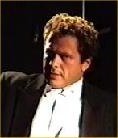CHI 2005: Closing Plenary (original) (raw)
Closing Plenary, Thursday 7 April
| Closing Plenary Speaker |
|---|
 Michel Waisvisz STEIM Foundation, The Netherlands Michel Waisvisz STEIM Foundation, The Netherlands |
Looking forward by looking back: early gestural interfaces for live electronic music composing and performance — a lecture concertante
At present the future of human computer interfacing is coming from a relatively short and largely unwritten history. It's a good moment for an early look back and find leads for future developments. Waisvisz will present observations on early interfaces he designed for music and music theater practice. He will play and demonstrate some of these instruments.
The precision and complexity of musical perception puts high demands on interfaces for music performance; the relatively simple and sometimes home built solutions waisvisz applied to the field have proven to be very effective and reliable in a performance practice of about 35 years.
The hearing and appreciation of music runs via an extremely refined sonic perception of timing and layering of sound events. The performer’s minute changes in tempo and dynamics induce into the receptive and sensitive body/mind of the listener/dancer a sensation of musical 'grooves' and 'streams'. To achieve this the instruments that convey the performer’s intentions and musical drives need to allow for: high sensitivity, immediacy, repeatability/reliability, fast interaction loops, intuitive physical interaction with complex data fields and for mastering of effort management (ergonomics being replaced by consciously designing for physical effort in order to increase musical tension).
Waisvisz considers music as a demanding, critical and therefore effective testing ground for experimentation in tangible data interfaces.
Waisvisz' early analog and more recent analog/digital experimental instrumental concepts can give hints and directions to future complex data control in the hands of people as required in situations where electronic communication channels needs to be extended with non-verbal and more emotional content.
Topics of Waisvisz’ lecture concertante will include:
- touch as intelligent agent in musical instruments
- electronic integration of the body in the electronic circuit
- composing by touching data: gestural manipulators for live composing/performing
- multi-level interaction instruments: ranging from meta manipulation to event manipulation
- introducing musical tension: forcing effort into the design of new musical instruments
- fragility as desired design concept for sensitive instruments
- reliability more guarantied by cheaper replacable technology than expensive rare systems
- the unique quality of personal instruments
- interface metaphors characterises the way the performers approach play the instrument
- animistic interfaces: the intriguing lesson interface designers can learn from puppeteers
- crackle boxes, haptic webs, 'conductive' instruments for collaborative musical instruments, 'the hands', data scratching: old and new, theatrical spark fencing, sonic massage interface, gestural energy/sound generator, etc.
- designing new instruments for a future without reliable electricity: gestural generators